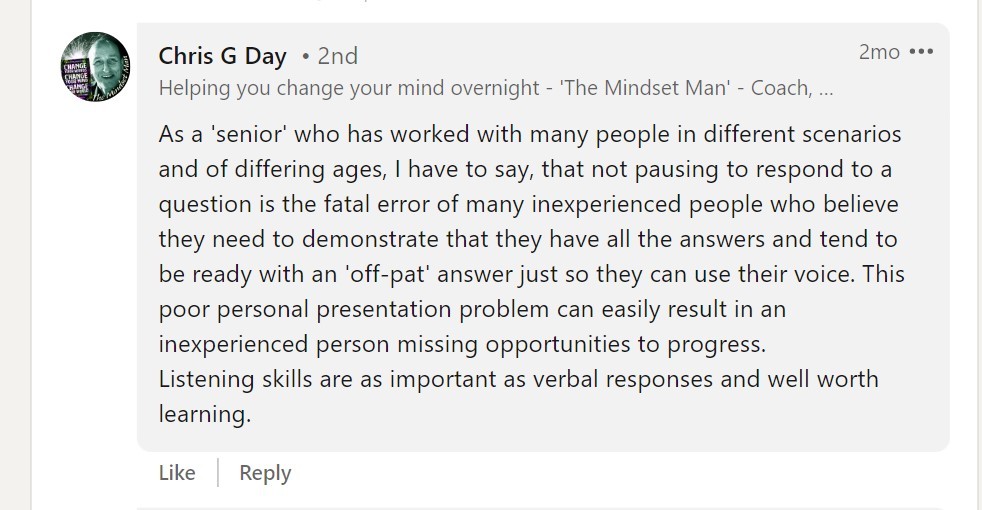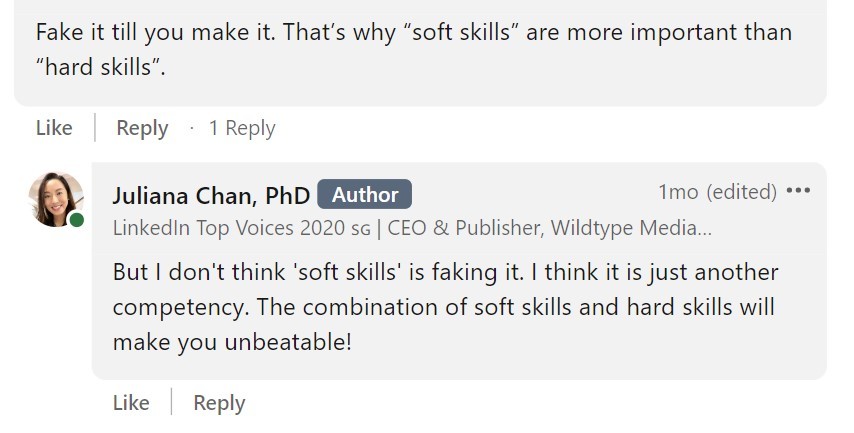How to appear more senior in 3 simple steps
Mar 09, 2023
Find Your Superpower newsletter 004
Read time: 7 minutes
Topics covered: Public speaking, interview tips, performance review
This newsletter builds on a post I wrote on LinkedIn some three months ago, called “How to appear more senior in 3 simple steps,” which set my account on 🔥. (This newsletter is modified slightly for greater clarity.)
I felt compelled to write that post based on my experience watching truly senior and powerful people communicate with each other at industry and networking events. Here, senior refers to professional seniority, not age.
Over the years, it became painfully obvious to me that there are a bunch of simple, idiot-proof rules that, once followed, could be a gamechanger especially for younger leaders and women trying to hustle a seat at the table.
And I was right, my post hit some kind of nerve, with 400,000+ impressions on LinkedIn and an inbox overflowing with DMs and war stories from both junior and senior professionals.
Just to be clear, I was trained as a scientist—I was never a communication or PR expert. I was 15 years behind everyone else when I transitioned from academic research into a media entrepreneur CEO role, at the ripe old age of 35. Which is why it was even more important for me to communicate better.
I wrote this post for me, and I hope you benefit as well.
Snapshot of my life before these simple communication hacks:
- Regularly asking my investor to babysit me at business pitches to assure the client that someone experienced was in charge, when really, it was just little ole me (I had to let my pride sit out this one 🤕)
- Unable to close business pitches or recruit top talent at the beginning of my CEO journey because I just didn’t have the gravitas others had expected from me
- General anxiety about my public speaking, negotiation and persuasion skills being subpar and unsophisticated when networking with an international crowd
Snapshot of my life after these simple communication hacks (still a WIP):
- Leading pitches confidently for six- to seven-digit contracts and managing Q&A sessions where I am grilled by an entire judging committee of 10-20 tough cookies
- Moderating an international press conference at the WEF Annual Meeting in Davos on the outbreak of COVID-19 with the Chief Scientist of the World Health Organization
- Being much more confident when networking with business and political leaders at top conferences, even if I am not the expert on the topic... by a long mile
You ready? Let’s do this.
Step one: Pause for 2-3 seconds to formulate your thoughts
Junior individuals tend to respond immediately. ❌
Senior individuals tend to pause and think before they speak. ✅
When you wait 2-3 seconds before you respond, you appear to have more gravitas than if you shoot off the first answer that comes to mind.
An easy one: "Why do you want to work here?"
Junior reply: Because...
Senior reply: <Pause for 2-3 seconds> Well, I'm glad you asked. Lots of factors made me apply for this job, such as the culture and mission of the company.
Another easy one: "What is your expected salary?"
Junior reply: I expect $$$.
Senior reply: <Pause for 2-3 seconds> Hmm, there are a few ways we could approach this discussion. Here’s the projects I would be a good fit for/Here’s my experience in these types of projects which could help us find a suitable range.
The challenge with responding quickly is that you probably end up giving a shallow, poorly formulated answer... I call it a mind fart!
This is also the point most people agreed with:

Couldn't say it better myself, Chris!

I used to blurt out my first mind fart too, Azman!
Step two: Speak in full sentences that add value
Junior individuals tend to speak in short, low-value phrases. ❌
Senior individuals tend to speak in longer, high-value phrases. ✅
When I wrote this post three months ago, some people took umbrage to this point, which is why I decided to revise the point to indicate low-value (simple) and high-value (complex).
Among the comments, there was an incorrect assumption that I wanted everyone to (1) speak in long, waffling sentences or to (2) beat around the bush.
I think this newsletter format allows me to provide more clarity with what I mean, and I would love the opportunity to explain further.
“So, what do you think of management’s new strategy?” “Erm, OK for me.”
“Any news on big-time client’s decision?” “No news.”
When sustained over time in a professional setting, responding this way results in the following dynamic created:
- Typically, the person asking the question would have to probe for more information and it results in a one-sided conversation that’s both awkward and tiring for the seeker
- It could suggest the junior person is not confident enough to provide an opinion or elaborate on their reply, creating an even more glaring power asymmetry than we would like
- Alternatively, it could give the impression of a lack of motivation and investment into the conversation, like an emo-depressive teenager who wants to play their video games but is being grilled by their mom
- It is just intellectually lazy, because there is no reason that we cannot communicate better by following up with a simple (1) why the strategy works for me, or (2) what our follow up action is
Step three: Avoid engaging in binary thinking
Junior individuals appear to engage in binary thinking. ❌
Senior individuals appear to avoid binary thinking. ✅
When we are young, our experiences mainly come from school. At least where I was educated, we were taught to search for the correct answer, that there’s a right or wrong answer to everything.
But in the real world, there are 50 shades of grey to any debate, so appearing binary in our thinking shows our superficial understanding of complex topics that may have multiple stakeholders and multifactorial considerations to weigh up.
For example, if someone asks us to comment on a hot-button topic such as “Are COVID-19 vaccines safe?” or “Is remote work a killer of collaboration?", here’s what we won’t do:
❌ Respond instantly (Step 1)
❌ Say it is good or bad (Step 2)
❌ Reject any opposing viewpoint (Step 3)
Here’s what we’ll do instead:
✅ Pause and think (Step 1)
✅ Provide a nuanced reply on pros vs cons (Step 2)
✅ Acknowledge valid viewpoints beyond our own (Step 3)
Soft skills and hard skills are not a zero-sum game
What I shared with you today is what we call a communication hack. It works like magic during interviews or when speaking publicly.

From comments like this, I think some people may be confusing the role of soft skills vis-à-vis hard skills. We should always complete our thoughts with a high-value, high-quality reply, based on our technical knowledge, experience and training.
You need both to succeed.
A hack cannot replace true expertise, but if properly applied, can help us in dynamic situations where there is a significant power asymmetry to overcome, and save us from embarrassment from shooting off the first mind fart that pops into our head.
For those of you who made it this far and are willing to implement these ideas, congratulations! You now sound like:
🚀 A Vice President or Director
🚀 A panelist at Davos
🚀 Someone that your boss or interviewer will pay more attention to
Thanks for reading issue 004 of my weekly Find Your Superpower newsletter.
See you next week.
Besides my newsletter, here’s how I can help:
- Buy my 1h on-demand video course on professional branding, called Find Your Superpower: How to Rebrand Yourself on LinkedIn. It will help you identify your professional brand, write a brand statement from scratch, and create original content and network on LinkedIn.
- Sign up to my newsletter mailing list to receive a 10% DISCOUNT coupon code for the masterclass.
- My team and I offer a suite of LinkedIn services, including LinkedIn corporate team training, company account management, LinkedIn Live event hosting and moderation, custom profile revamps and ghostwriting services. Write to me for more information.